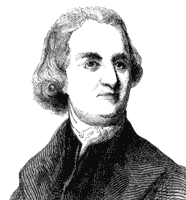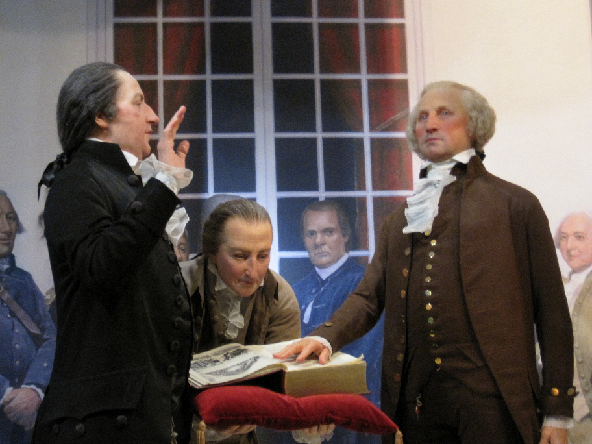
The Patriot’s History Reader by Schweikart, Dougherty, and Allen
 The Patriot’s History Reader is a companion volume to the Patriot’s History of the United States. However, it works very well as a stand-alone volume. The format is simple and unadorned. Each section begins with a brief essay in which the authors offer some commentary and general observations on the relevance and significance of the documents to be presented. Then each is introduced with a few paragraphs, which provide some context for its writing, and pose some of the questions that should be considered when reading the document. The authors neither answer the questions, nor present conclusions. It is, in parts, almost Socratic in style.
The Patriot’s History Reader is a companion volume to the Patriot’s History of the United States. However, it works very well as a stand-alone volume. The format is simple and unadorned. Each section begins with a brief essay in which the authors offer some commentary and general observations on the relevance and significance of the documents to be presented. Then each is introduced with a few paragraphs, which provide some context for its writing, and pose some of the questions that should be considered when reading the document. The authors neither answer the questions, nor present conclusions. It is, in parts, almost Socratic in style.
However, the book’s short introduction is not Socratic. The authors explain that until very recently, the historic speeches and writings of prominent American political figures agreed with the premise of American exceptionalism. It is not that the American people are different in some genetic manner, but that America is out of the norm – exceptional.
In founding a Protestant Christian nation based on English common law, the American colonists repudiated absolutism and an autocratic form of government. In adopting common law, America asserted the idea that laws are handed from God to the people, and that in making laws elected representatives should look to the customs and traditions of the people, fine-tuning and administering those laws with respect both to the tradition and to legal precedent. By itself this concept of law that ultimately resides in the people rather than some supreme lawgiver, whether secular or clerical, was unique. The United States, by adopting this view stood nearly alone in the world. To function, a system of common law administered by elected officials required a generally virtuous citizenry, and virtue required a moral compass. Morality, in turn required religious beliefs that recognize a power higher than oneself. In many respects this concept of power, residing in the people, and tempered by virtue, is the foundation of American exceptionalism.
This unique fact shines through most of the documents presented in the Reader. They are organized chronologically and are not always what one might expect. For example, none of the Federalist Papers are included in this volume. The book covers the country’s founding, to the present day, ending with President Obama’s Cairo speech.
This review will focus on a few of the documents created early in America’s history.
The Mayflower Compact is the first document presented in The Patriot’s History Reader. It is very brief, but notable for originating from the will of the people themselves, rather than from a local legislature instantiated by the king’s governor.
 The Rights of The Colonists, written by Samuel Adams in 1772, presages the tenth amendment of the U.S. Constitution by 15 years. In it Adams echoes the philosophies of John Locke, maintaining that the purpose of society is the protection of the rights of the individual against oppression by the state. In The Rights of The Colonists, he also argues that government cannot lawfully rescind God-given rights. This essay is a clear statement of the principles upon which the United States was founded and its echoes resound in many subsequent works. For instance:
The Rights of The Colonists, written by Samuel Adams in 1772, presages the tenth amendment of the U.S. Constitution by 15 years. In it Adams echoes the philosophies of John Locke, maintaining that the purpose of society is the protection of the rights of the individual against oppression by the state. In The Rights of The Colonists, he also argues that government cannot lawfully rescind God-given rights. This essay is a clear statement of the principles upon which the United States was founded and its echoes resound in many subsequent works. For instance:
Man should be free to leave or join a society as he deems fit.
All men have a right to remain in a state of nature as long as they please; and in case of intolerable oppression, civil or religious, to leave the society they belong to, and enter into another.
Power is delegated to government, those powers not delegated are still retained by the people.
Every natural right not expressly given up, or, from the nature of a social compact, necessarily ceded, remains.
Two of George Washington’s writings are featured in the reader. The first of these is his Sentiments on a Peace Establishment. Wahington’s views were shaped by his experiences as a young man and by his service in the Revolution. The Reader’s editors point out that Washington believed that “every citizen owed his personal service and a portion of his property in defense of his country.” This view isn’t too popular today. Washington attempted to balance his concerns over the maintenance and the dangers of a large standing army, with the need to be prepared. He saw the importance of locally maintained militias as a means of avoiding the necessity of a large standing army.
It may be laid down as a primary position, and the basis of our system, that every Citizen who enjoys the protection of a free Government, owes not only a proportion of his property, but even of his personal services to the defence of it, and consequently that the Citizens of America (with a few legal and official exceptions) from 18 to 50 Years of Age should be borne on the Militia Rolls, provided with uniform Arms, and so far accustomed to the use of them, that the Total strength of the Country might be called forth at a Short Notice on any very interesting Emergency, for these purposes they ought to be duly organized into Commands of the same formation;Â …
He also pointed out the need to treat those serving with respect and honor,
…. Men of this description shall be viewed as the Van and flower of the American Forces, ever ready for Action and zealous to be employed whenever it may become necessary in the service of their Country; they should meet with such exemptions, privileges or distinctions, as might tend to keep alive a true Military pride, a nice sense of honour, and a patriotic regard for the public. Such sentiments, indeed, ought to be instilled into our Youth, with their earliest years, to be cherished and inculcated as frequently and forcibly as possible.
…
 By giving such a tone to our Establishment; by making it universally reputable to bear Arms and disgraceful to decline having a share in the performance of Military duties; in fine, by keeping up in Peace “a well regulated, and disciplined Militia,” we shall take the fairest and best method to preserve, for a long time to come, the happiness, dignity and Independence of our Country.
Things have changed … just a bit.
The Declaration of Independence, The Articles of Confederation, and the Constitution are all included within the Patriot’s Reader. The current crop of politicos in Washington would do well to re-acquaint themselves with the latter document, at a minimum. Of particular salience today is Article 1, Section 1.
 All legislative Powers herein granted shall be vested in a Congress of the United States …
and especially, with all that is transpiring with regard to the budget and the debt ceiling, Article 1, Section 7:
All bills for raising Revenue shall originate in the House of Representatives; but the Senate may propose or concur with Amendments as on other Bills.
One of the most interesting documents in the collection is Mercy Otis Warren’s: Observations On The New Constitutions and On The Federal and State Conventions. This pamphlet was published anonymously and was, for a long time attributed to Elbridge Gerry. However, it was Mercy Otis Warren, one of the foremost female intellectuals of her time, who wrote this anti-Federalist tract in opposition to ratification of the Constitution.  Warren’s intellectual capacity and erudition are a pleasure to read.
Here, like Hamilton in the Federalist, Warren quotes the Abbe Mable,
Self defence is a primary law of nature, which no subsequent law of society can abolish; this primaeval principle, the immediate gift of the Creator, obliges every one to remonstrate against the strides of ambition, and a wanton lust of domination, and to resist the first appraches of tyranny, which at this day threaten to sweep away the rights for which the brave Sons of America have fought with an heroism scarcely paralleled even in ancient republicks. It may be repeated, they have purchased it with their blood, and have gloried in their independence with a dignity of spirit, which has made them the admiration of philosophy, the pride of America, and the wonder of Europe. It has been observed, with great propriety, that “the virtues and vices of a people“ when a revolution happens in their government, are the measure of the liberty or slavery they ought to expect — An heroic love for the publick good, a profound reverence for the laws, a contempt of riches, and a noble haughtiness of “soul, are the only foundations of a free government.â€
And here she speaks of the right of the people to determine their government and the right to take their time in doing so. At the end of this section she deplores the actions of patriots who are throwing away their laurels and casts some aspersions at unnamed, power-seeking activists (perhaps Alexander Hamilton?)
All writers on government agree, and the feelings of the human mind witness the truth of these political axioms, that man is born free and possessed of certain unalienable rights— that government is instituted for the protection, safety and happiness of the people, and not for the profit, honour, or private interest of any man, family, or class of men — That the origin of all power is in the people, and that they have an incontestible right to check the creatures of their own creation, vested with certain powers to guard the life, liberty and property of the community: And if certain selected bodies of men, deputed on these principles, determine contrary to the wishes and expectations of their constituents, the people have an undoubted right to reject their decisions, to call for a revision of their conduct, to depute others in their room, or if they think proper, to demand further time for deliberation on matters of the greatest moment: it therefore is an unwarrantable stretch of authority or influence, if any methods are taken to preclude this peaceful and reasonable mode of enquiry and decision. And it is with inexpressible anxiety, that many of the best friends of the Union of the States—to the peaceable and equal participation of the rights of nature, and to the glory and dignity of this country, behold the insiduous arts, and the strenuous efforts of the partisans of arbitrary power, by their vague definitions of the best established truths, endeavoring to envelope the mind in darkness the concomitant of slavery, and to lock the strong chains of domestic despotism on a country, which by the most glorious and successful struggles is but newly emancipated from the spectre of foreign dominion. — But there are certain seasons in the course of human affairs, when Genius, Virtue, and Patriotism, seems to nod over the vices of the times, and perhaps never more remarkably, than at the present period; or we should not see such a passive disposition prevail in some, who we must candidly suppose, have liberal and enlarged sentiments; while a supple multitude are paying a blind and idolatrous homage to the opinions of those who by the most precipitate steps are treading down their dear bought privileges; and who are endeavouring by all the arts of insinuation, and influence, to betray the people of the United States, into an acceptance of a most complicated system of government; marked on the one side with the dark, secret and profound intrigues, of the statesman, long practised in the purlieus of despotism; and on the other, with the ideal projects of young ambition, with its wings just expanded to soar to a summit, which imagination has painted in such gawdy colours as to intoxicate the inexperienced votary, and to send him rambling from State to State, to collect materials to construct the ladder of preferment.
Then a few lines later, she points out that the road to hell may be paved with good intentions, and that even the most virtuous may take the wrong path.
Man is not immediately corrupted, but power without limitation, or amenability, may endanger the brightest virtue — whereas frequent return to the bar of their Constituents is the strongest check against the corruptions to which men are liable, either from the intrigues of others of more subtle genius, or the propensities of their own hearts, …
Warren also foresaw problems with the new government which were addressed by the subsequent ratification of the Bill of Rights. However, not all of them were. Some of her concerns have been validated. She showed remarkable prescience. For example:
As the new Congress are empowered to determine their own salaries, the requisitions for this purpose may not be very moderate, and the drain for public moneys will probably rise past all calculation …
and
There is no provision for a rotation, nor anything to prevent the perpetuity of office in the same hands for life; which by a little well timed bribery, will probably be done, to the exclusion of men of the best abilities from their share in the offices of government.— By this neglect we lose the advantages of that check to the overbearing insolence of office, which by rendering him ineligible at certain periods, keeps the mind of man in equilibrio, and teaches him the feelings of the governed, and better qualifies him to govern in his turn.
And in the spirit of never letting a good crisis go to waste, Warren had this to offer:
But let the best informed historian produce an instance when bodies of men were entrusted with power, and the proper checks relinquished, if they were ever found destitute of ingenuity sufficient to furnish pretences to abuse it. And the people at large are already sensible, that the liberties which America has claimed, which reason has justified, and which have been so gloriously defended by the swords of the brave; are not about to fall before the tyranny of foreign conquest: it is native usurpation that is shaking the foundations of peace, and spreading the sable curtain of despotism over the United States.
Finally, even if you’ve already read Washington’s First Inaugural Address, it’s worth another look.  Fortunately, it is available on line and the Reader includes it as well. Washington collaborated with Madison on this eloquent discourse. In it Washington conveys the humility and gratitude the new nation owes to God.
No people can be bound to acknowledge and adore the Invisible Hand which conducts the affairs of men more than those of the United States. Every step by which they have advanced to the character of an independent nation seems to have been distinguished by some token of providential agency; and in the important revolution just accomplished in the system of their united government the tranquil deliberations and voluntary consent of so many distinct communities from which the event has resulted can not be compared with the means by which most governments have been established without some return of pious gratitude, along with an humble anticipation of the future blessings which the past seem to presage. These reflections, arising out of the present crisis, have forced themselves too strongly on my mind to be suppressed. You will join with me, I trust, in thinking that there are none under the influence of which the proceedings of a new and free government can more auspiciously commence.

He also provides the following warning:
… here is no truth more thoroughly established than that there exists in the economy and course of nature an indissoluble union between virtue and happiness; between duty and advantage; between the genuine maxims of an honest and magnanimous policy and the solid rewards of public prosperity and felicity; since we ought to be no less persuaded that the propitious smiles of Heaven can never be expected on a nation that disregards the eternal rules of order and right which Heaven itself has ordained; and since the preservation of the sacred fire of liberty and the destiny of the republican model of government are justly considered, perhaps, as deeply, as finally, staked on the experiment entrusted to the hands of the American people.
These snippets only represent a fraction of what is in the Patriot’s History Reader.  The rewards for reading these documents and speeches far outweigh the time invested. They are, for the most part, surprisingly clear and succinct. The editors are to be commended for assembling this collection. Buy the book!
 The posts are coming!
The posts are coming!


0 comments
Kick things off by filling out the form below.
Leave a Comment